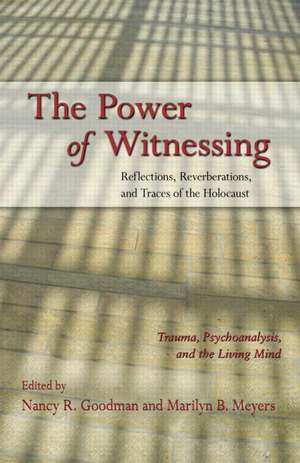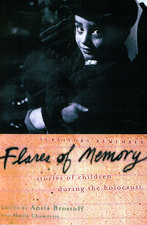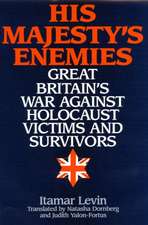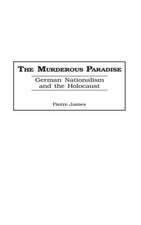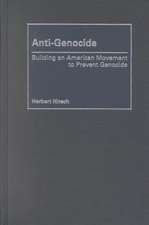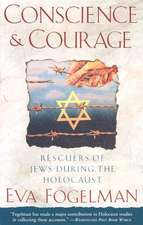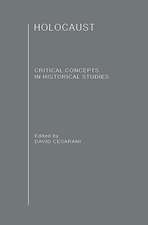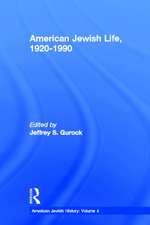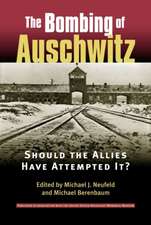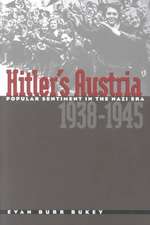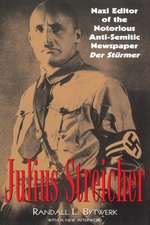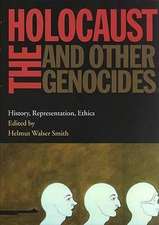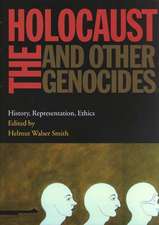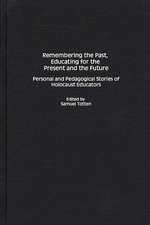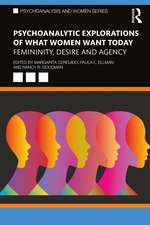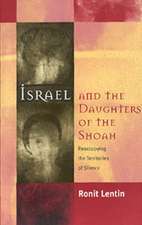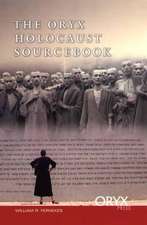The Power of Witnessing: Reflections, Reverberations, and Traces of the Holocaust: Trauma, Psychoanalysis, and the Living Mind
Editat de Nancy R. Goodman, Marilyn B. Meyersen Limba Engleză Paperback – 21 mar 2012
The answer, as deftly illustrated by Nancy Goodman and Marilyn Meyers, lies in the power of witnessing: the act of acknowledging that trauma took place, coupled with the desire to share that knowledge with others to build a space in which to reveal, confront, and symbolize it. As the contributors to this book demonstrate, testimonial writing and memoir, artwork, poetry, documentary, theater, and even the simple recollection of a memory are ways that honor and serve as forms of witnessing. Each chapter is a fusion of narrative and metaphor that exists as evidence of the living mind that emerges amid the dead spaces produced by mass trauma, creating a revelatory, transformational space for the terror of knowing and the possibility for affirmation of hope, courage, and endurance in the face of almost unspeakable evil. Additionally, the power of witnessing is extended from the Holocaust to contemporary instances of mass trauma and to psychoanalytic treatments, proving its efficacy in the dyadic relationship of everyday practice for both patient and analyst.
The Holocaust is not an easy subject to approach, but the intimate and personal stories included here add up to an act of witnessing in and of itself, combining the past and the present and placing the trauma in the realm of knowing, sharing, and understanding.
Contributors: Harriet Basseches, Elsa Blum, Bridget Conley-Zilkic, Paula Ellman, Susan Elmendorf, George Halasz, Geoffrey Hartman, Renee Hartman, Elaine Neumann Kulp-Shabad, Dori Laub, Clemens Loew, Gail Humphries Mardirosian, Margit Meissner, Henri Parens, Arlene Kramer Richards, Arnold Richards, Sophia Richman, Katalin Roth, Nina Shapiro-Perl, Myra Sklarew, Ervin Staub.
| Toate formatele și edițiile | Preț | Express |
|---|---|---|
| Paperback (1) | 405.71 lei 6-8 săpt. | |
| Taylor & Francis – 21 mar 2012 | 405.71 lei 6-8 săpt. | |
| Hardback (1) | 1107.48 lei 6-8 săpt. | |
| Taylor & Francis – 27 mar 2012 | 1107.48 lei 6-8 săpt. |
Preț: 405.71 lei
Preț vechi: 427.07 lei
-5% Nou
Puncte Express: 609
Preț estimativ în valută:
77.64€ • 80.76$ • 64.10£
77.64€ • 80.76$ • 64.10£
Carte tipărită la comandă
Livrare economică 15-29 aprilie
Preluare comenzi: 021 569.72.76
Specificații
ISBN-13: 9780415879033
ISBN-10: 0415879035
Pagini: 432
Ilustrații: 20 colour illustrations, 8 black & white halftones
Dimensiuni: 152 x 229 x 25 mm
Greutate: 0.56 kg
Ediția:1
Editura: Taylor & Francis
Colecția Routledge
Locul publicării:Oxford, United Kingdom
ISBN-10: 0415879035
Pagini: 432
Ilustrații: 20 colour illustrations, 8 black & white halftones
Dimensiuni: 152 x 229 x 25 mm
Greutate: 0.56 kg
Ediția:1
Editura: Taylor & Francis
Colecția Routledge
Locul publicării:Oxford, United Kingdom
Public țintă
Postgraduate, Professional, and Professional Practice & DevelopmentCuprins
Goodman, Meyers, Introduction. Part I: A Triptych of the Power of Witnessing. Goodman, The Power of Witnessing. Meyers, Historic and Psychic Timeline: Opening and Closing the Space for Witnessing. Goodman, The "Anti-Train": A Metaphor for Witnessing. Part II: Reflections. Laub, Testimony as Life Experience and Legacy. Hartman, G., A Note on the Testimony Event. Parens, A Holocaust Survivor's Bearing Witness. Richman, "Too Young to Remember": Recovering and Integrating the Unacknowledged Known. Part III: Reverberations. Sklarew, Leiser's Song. Halasz, Psychological Witnessing of My Mother's Holocaust Testimony. Hartman, R., Bergen-Belsen 2009. Roth, Miklós: A Memoir of My Father. Meissner, The Power of Memorable Moments. Meyers, The Defiant Requiem: Acts of Witnessing. Kulp-Shabad, One Thousand Days in Auschwitz: Joseph Neumann and the Will to Live. Loew, My Lost Father. Meyers, The Shadow of Shira. Part IV: Traces. Richards, A. K., Blood: Reading the Holocaust. Shapiro-Perl, Through the Eye of the Needle: The Art of Esther Nisenthal Krinitz: Witnessing the Witness through Filmmaking. Blum, A Photographic Commentary on the Memorial to the Murdered Jews of Europe. Goodman, Opening the Mind to Trauma through Oscillations of Focus: Learning from the Film Schindler's List. Humphries Mardirosian, Giving Voice to the Silenced through Theater. Richards, A., Witnessing the Death of Yiddish Language and Culture: Holes in the Doorposts. Part V: Links. Meyers, Trauma, Therapy, and Witnessing. Goodman, Basseches, Ellman, & Elmendorf, "We're in This Too": The Effects of 9/11 on Transference, Countertransference, and Technique. Conley-Zilkic, What Do You Want? On Witnessing Genocide Today. Goodman, Meyers, Interview with Ervin Staub.
Notă biografică
Nancy R. Goodman, Ph.D., is a Training and Supervising Analyst with the New York Freudian Society (Washington, DC Program) and the International Psychoanalytic Association. She writes on female development, analytic listening, Holocaust trauma and witnessing, film and psychoanalysis, enactments, and sadomasochism. Her most recent publications include "Enactment: Opportunity for Symbolizing Trauma" (Ellman & Goodman, 2011) and "Nancy Goodman Wonders What Is Normal in Myth and Psychic Reality" (2010); she is currently working on Battling the Life and Death Forces in Sadomasochism: Theoretical and Clinical Perspectives (Karnac, 2013; with Harriet Basseches and Paula Ellman). She maintains a full-time psychoanalytic practice in Bethesda, Maryland.
Marilyn B. Meyers, Ph.D., is on the faculty of the Washington School of Psychiatry, where she teaches and supervises in the postgraduate program. She is President of the Section on Couples and Families of the Division of Psychoanalysis (39) of the APA, and has a longstanding interest in working with Holocaust survivors and their children. Her publications include "When the Holocaust Haunts the Couple: Hope, Guilt and Survival" (2005) in Psychoanalytic Perspectives on Couple Work, and "Am I My Mother's Keeper? Certain Vicissitudes in the Mother-Daughter Relationship Concerning Envy" (1988) in The Mother-Daughter Relationship. In addition, she has presented papers on the use of film to illustrate the aftermath of massive trauma. She maintains a private practice where she sees individuals and couples.
Marilyn B. Meyers, Ph.D., is on the faculty of the Washington School of Psychiatry, where she teaches and supervises in the postgraduate program. She is President of the Section on Couples and Families of the Division of Psychoanalysis (39) of the APA, and has a longstanding interest in working with Holocaust survivors and their children. Her publications include "When the Holocaust Haunts the Couple: Hope, Guilt and Survival" (2005) in Psychoanalytic Perspectives on Couple Work, and "Am I My Mother's Keeper? Certain Vicissitudes in the Mother-Daughter Relationship Concerning Envy" (1988) in The Mother-Daughter Relationship. In addition, she has presented papers on the use of film to illustrate the aftermath of massive trauma. She maintains a private practice where she sees individuals and couples.
Recenzii
"We can be grateful for the publication of this book. It serves not only as a reminder of a deplorable human conflagration that Pines and others have urged us not to forget, but also as a reminder that we psychoanalysts need to resist the pull to overlook or deny the impact of external reality upon our patients. The book represents a counterweight to the unfortunate tendency that has arisen within our profession
to overvalorize the here-and-now interaction between patient and therapist, to the exclusion of appreciating what the patient has experienced en route to the analyst’s office. " The Psychoanalytic Quarterly, 2014
"Goodman and Meyers’s primarily experiential book stands testament to the power of witnessing. It allows readers to imagine what it might have been like to have experienced the unimaginable. The editors’ passion and dedication to their mission to keep the memory of the Holocaust experience alive in the minds of the living is impressive, scholarly, and creative. Their book will be of value to psychotherapists and psychoanalysts treating patients with traumatic experiences of varying degrees of severity." -Journal of the American Psychoanalytic Association
"This book manages to include many different voices and perspectives on the large subject of witnessing. There is much to be learned from this collection. Readers of this book will be challenged in unexpected ways. Memories may be stirred, and genealogies may be questioned. The editors are to be applauded for their choices and for bringing together all of this material in one volume." –Division Review
"Witnessing is indeed a process that involves experiencing the trauma. Goodman and Meyers' work with survivors and their children is an area that we need to continually observe. But it is not just the Holocaust that needs repeated witnessing—it is all areas of trauma. The Power of Witnessing focuses on the intimacy of the therapist with the survivor, which in turn helps widen the survivor's awareness of the residues and their continuing influences. This witnessing makes possible resilience." - Henry Krystal, M.D., author, Integration and Self-Healing (The Analytic Press, 1993)
"Witnessing—most readily thought of in terms of the Holocaust—is actually a vital intersubjective phenomenon that is central to the way that the interpersonal process facilitates individual consolidation and growth. As does a clinical analysis, so does this piercingly wise study of witnessing engage the reader in the active emotional experience of learning, leading one to know from both inside and outside, to understand from new depths. The contributions within this work expose not only the impact of trauma but, importantly, how the very act of witnessing is itself essential to life, to change, and to growth. It was so for me and I believe will be so for others: The reader of this powerful contribution will learn and will be enriched by the learning." - Warren S. Poland, author, Melting the Darkness (Jason Aronson, 1996)
"Part memoir, part ethnography, part depth-psychology, and part documentation of an event of human history where mountains of evil and occasions of sorrow met like never before, The Power of Witnessing is a stunning addition to the Holocaust-related literature. Distinguished psychoanalysts have joined hands with poets, painters, geriatricians, professors of English, and performing artists to produce a powerful collage of human suffering and resilience. The book is, at times, painful to read but never does it cease to be engaging and illuminating about the informative role played by those who have faced such suffering first-hand. It gently but firmly takes our hand and invites us to join the circle of witnesses to a great human tragedy. The book therefore serves both clinical and humanitarian purposes!" - Salman Akhtar, Jefferson Medical College, Pennsylvania, USA
Thank you to Nancy Goodman and Marilyn Meyers for the gift of The Power of Witnessing. Once you start this remarkable book, you don't want to put it down. That may seem very surprising when you are reliving and witnessing one of the worst examples of narcissistic rage and human destruction the world has ever seen. In some ways it is still beyond comprehension. However, you realize as soon as you start reading some of these descriptions that we owe it to every single person in the book (and elsewhere) who has suffered like this not only to read their story but to honor their ability to finally tell the world what they have suffered and lost. We must witness all of this and bear the pain. By being there with them and sharing it word for word, we can feel that we are doing our part in helping them not to feel alone and helping the world not to forget. When Dori Laub describes wanting to hug each person after they have given their testimony of their Holocaust experiences, I had the same experience as I finished each chapter. The sense of intimacy was profound. I thank Nancy and Marilyn for this incredible privilege and what they have given the world." - Carolyn Ellman, editor, The Modern Freudians (Jason Aronson, 1999)
"As I began to read this book I thought that I didn't want to feel what others had witnessed. Then I thought perhaps I am too ashamed by my fascination with the views that may be provided by those who witnessed these horrors. I now realize that all of my expectations were set ajar by the depth of humanity of the authors' experiences. Rather than turn away in horror I found that I was provided new hope that even in the most terrible of circumstances other human beings can offer something that makes one proud of our species. All who want to be reminded of the honor of life and the valor of some fellow beings should read these deeply moving accounts and new conceptualizations." - Steven J. Ellman, author, When Theories Touch (Karnac, 2010)
"The Power of Witnessing is a rich, disturbing, provocative, startling but ultimately inspiring collection of essays related to the Holocaust by some of the leading thinkers of our time on some of its key issues. We encounter incredible stories of cruelty, elevating ones on how to rise above it, and the challenge of retelling those stories. Though the focus on one level is the Holocaust, on another level it is really about the human condition. The book holds up a mirror for us to see ourselves—whether we are students or faculty on campus, those involved in interfaith relations or simply wish to reflect on the follies of man. Anyone who believes in our common humanity must take a long, hard look into this mirror. I am grateful to the contributors for allowing us this privilege. Read this book if you wish to confront the human condition and discover ways of transcending it." - Professor Akbar Ahmed, American University, Washington DC, USA, and author, Journey into America (Brookings Institution Press, 2010)
"Nancy Goodman and Marilyn Meyers have contributed a gripping collection—told by survivors of the Holocaust and the witnesses to their testimonies—about the power of witnessing. These highly personal essays are an important addition to the growing 'literature of testimony.' There can never be too many. Goodman, Meyers, and the authors in their book affirm that the power of witnessing lies in the restoration of humanity born in the process of the telling and the receiving of the horrors that mark this period in our collective history. The spiral of witnessing—across generations and consulting rooms, in the narratives, poetry, and images—leaves so much more than 'a trace.'" - Rachel Peltz, Psychoanalytic Institute of Northern California, USA
"As an artist and as the only daughter to Holocaust survivors, I celebrate the publication of The Power of Witnessing. Those of us raised in the presence of absence understand the necessity not only to 'remember' but to find a way of healing. There is no question that the writings in this book—whether coming from a psychoanalytic understanding or the beauty of a Myra Sklarew poem—emphasize finding a way to make peace with loss, to come full circle and allow the survival of beauty to live on." - Mindy Weisel, artist, Washington, DC, USA
"The Power of Witnessing, edited by Nancy Goodman and Marilyn Meyers, invites us to revive the horror, the outrage, and the violence done to blameless people during the Holocaust—and to their descendents. As the contributors to this book vividly demonstrate, the acts of witnessing that cause us to remember are not on behalf of a just revenge for injustice done; they remind us to do the work necessary within ourselves and our societies to do everything possible to ensure that its like will never happen again. The book combines oral history and psychoanalytic insight with moral persuasion." - Charles Hanly, International Psychoanalytical Association
"Let me begin by saying I was reluctant to read this book. I anticipated it would be depressing and traumatizing. How wrong I was. In their edited book, The Power of Witnessing, Drs. Goodman and Meyers illustrate the importance of witnessing as an agent in healing. By using the experiences of authors who tell the story of their own trauma or witnessing the trauma of others during the Holocaust, the editors have broadened our understanding of witnessing to all important life events. At a time in our modern history when we are exposed to so many traumas in the world, it is especially important we not become immune but instead listen and try to understand the human effect these experiences have on individuals, groups, and society. All who want to help expand the human experience of others and themselves, whether they are psychotherapists, parents, teachers, or loving friends, should read this book." - Joyce Lowenstein, psychologist
"A deeply moving and important work. Goodman and Meyers' book brings together an exceptional group of papers which constitute a succession of Odysseys. Together they create a vivid testimony to human resilience in the face of essentially unimaginable terror and sadism. Through their nightmares and those confronted by each contributor, we learn just why the Holocaust is timeless and belongs to everyone and just why we must attend to all such new incidents with vigilance and inward questioning, balanced by the imperative we remain curious." - David Tuckett, University College London, and Fellow of the Institute of Psychoanalysis, London, UK
"Nancy Goodman and Marilyn Meyers' edited book, The Power of Witnessing, offers us a compelling and moving array of testimonies to the Holocaust. Through prose, poetry, film, and art, these distinguished authors allow us to witness the Holocaust and reflect on the long shadow it has cast on future generations. Each contributor provides an important window into this haunting and profoundly disturbing time in our history. As therapist editors, Goodman and Meyers bring a deep understanding of the necessity and power of witnessing—to know what was previously unknowable." - Kerry Malawista, co-author of The Bereaved Therapist (Columbia University Press, 2012)
"'There is nothing one man will not do to another.' Those words were written by the poet Carolyn Forche. It's the last line of her poem 'The Visitor' and it's separated or perhaps imprisoned on the page by white space. I've always found Forche's words haunting. There are some things I cannot even imagine. One is the Holocaust. Looking back on my life, I believe this word first became part of my vocabulary because of my mother. Growing up in the South Bronx in the 1950s, my mother worked in the Manhattan garment industry. Her employer and some of her fellow workers were Jewish. My mother was also a regular patron of small Jewish businesses in the Bronx, places where we purchased our food and clothes. Over counters, stories were shared and my mother came home with things she told me to never forget. Maybe this was my introduction to the importance of witnessing. What pain and silence was not hidden from my childhood eyes? Reading The Power of Witnessing made me think about memoir writing. The need to discover courage beneath the flesh. How does one find the strength to give testimony and the power not to forget? We live in an era of erasure. One click of a button can delete almost anything. And this is why the reflections and interviews in The Power of Witnessing contain not just the songs of survival but more the resiliency of living that can only be found in the human heart. There is such a thing as family and after all this suffering we must remember how to love. This is what we owe each other. Hopefully it will protect us from the trauma." - E. Ethelbert Miller, Poet and Director, African American Resource Center, Howard University
"Goodman and Meyers' groundbreaking book takes us on a journey where we grapple with the unthinkable horrors of the Holocaust. Their narrative, holding this richly diverse, edited collection of stunning memoirs and incisive essays, details their own encounters with first-person accounts and images of the brutality of the Holocaust. They pay close attention to the challenge of witnessing. The Power of Witnessing gives readers a vehicle to engage with the incomprehensible cruelty of the Holocaust and the hope of a greater capacity to be present with the suffering and pain of others." - Elizabeth Fritsch, Ph.D., President, New York Freudian Society
"Nancy Goodman and Marilyn Meyers have edited an important book, deeply moving and in many parts painful to read, helping us to reflect on the different aspects of the process of witnessing: its meaning and significance for the traumatized person as witness but also for the successive generations as listener and as secondary witness. This is particularly important in a time when the last survivors of the Holocaust are dying out. Remembering the Holocaust, we need to return to the witness's individual memory in order to not neglect the horrific, catastrophic, and traumatic experiential quality in the process of its historical description and classification." - Werner Bohleber, Ph.D., editor, Psyche
"This is a project of enormous reach, informed, most importantly, by a generous and empathic impulse to gather as many perspectives as possible for the purpose of reawakening attention to testimony, as opposed to dulling our collective interest through a dry academic recounting. It celebrates perhaps the most important action we can partake in as citizens living in the shadow of catastrophe: the dynamic and moral act of witnessing. This book reminds us of the great good that has come from that collective mission to keep memory alive through testifying and transmission, through cultural expression that's actively engaged with both historical archives and personal imagination. As a playwright and producer of Jewish theater, I find strength in its honoring the role of the witness and the power of collective witnessing—after all, isn't that what a theater audience is, a gathering of witnesses engaged in a collective act of empathy? I have a special appreciation for the chapters that specifically point to theater, film, photography, literature, and crafts as their own powerful transformational acts, finding redemptive byproducts in the creation and cultural responses to the Shoah, as we engage with history anew and afresh every time we experience a work of art drawn from the act of authentic witnessing. This is a compendium I'll keep returning to over the years, drawing inspiration and a grounding sense of the authentic. As we grow ever more distant from the Holocaust in time, vivid witnessing will keep its presence in our consciousness close, rich, and as real as we can possibly imagine." - Ari Roth, Artistic Director, Theater J
"The Power of Witnessing is an important contribution derived from the Holocaust. Nancy Goodman and Marilyn Meyers are well-respected psychoanalysts who have carefully studied the effects, direct and indirect, of witnessing the Holocaust. They clarify powerful ramifications not only for the survivors but for their children, relatives, and friends, illustrating vividly the power of witnessing such a grotesque degradation. Its extreme nature has led to impacts in a variety of fields and has lasting significance. The contributors to the book are very capable, and a particularly significant piece is an interview with Professor Irvin Staub. One hopes that this book will have far-reaching effects on those who care about our common humanity." - David A. Hamburg, M.D., President Emeritus, Carnegie Corporation of New York
"This is the book for adults who have an interest in the Holocaust and who know very little about it, and for people dealing with the effects of trauma caused by the very people who they thought were their friends and neighbors. It testifies to the healing power of talking about the shame of being a victim and the loss of faith in other people and the social system that a horror like the Holocaust leaves in its wake." - Fanya Gottesfeld Heller, author, Love in a World of Sorrow
"The Power of Witnessing is an overview of the teeming world of Jewish culture before the Holocaust and a living tribute to the memory of those who did not survive." - Aaron Lansky, President, Yiddish Book Center
"In demonstrating The Power of Witnessing, Goodman and Meyers illuminate the many subtle—and often surprising—aspects of this under-theorized topic. Without adhering to one dominant theoretical position, but resonating with several, a fundamental thread connects the varied chapters: our omnipresent need for a witness and the traumata that result from its absence or loss. This is a book about loss—individual and collective—and thus an exercise in mourning. But, more importantly, it is a profound testament to the healing powers of acknowledging, accepting, and absorbing the past through the mediation of witnessing. The reciprocal psychological changes in both witness and witnessed are revealingly articulated with courage and honesty by all who participated in this project. The process of mediation that allows terror of real experience to become symbolized, given voice, and shared are multiple, and multiply represented here: visual images, awake and dreaming; poetry; music; lists of names; memories and stories. Although the Holocaust is at its center, The Power of Witnessing speaks to a wider audience, and especially to those who seek to help others transform loss into hope for a future." - Bonnie Litowitz, Ph.D., Chicago Institute for Psychoanalysis
"Reading The Power of Witnessing was a deeply moving and enriching experience. I was obliged to relive the wrenching and inconsolable crying of my mother and her brothers when, at the end of World War II, they found out that all of their family had disappeared in Nazi concentration camps. It was an unimaginable pain that they could never recover from and which I have not forgotten, as I will never fail to remember the assassinations, injury, and terror that we Peruvians suffered during the years of violence in our country. The Hippocratic Oath dictates that the duty of the clinician is at times to cure, often to alleviate, and always to console. When there are such wrenching wounds as those caused by another human being, however, the duty broadens and compellingly demands the witnessing of the brutality of the occurrence and that we testify to it. As Freud wrote to Einstein: 'Brute force is overcome by union; the allied might of scattered units makes good its right against the isolated giant.' The magnificent and brave effort of Nancy Goodman and Marilyn Meyers to bring together a series of writings, of others as well as their own, that testify from different perspectives to the horror of the Holocaust, allows the reader to experience firsthand the power of witnessing." - Moisés Lemlij, M.D., University of Lima, Peru
"The Power of Witnessing is a powerful collection of papers that reaches into kinds of trauma that often are beyond words and that have affected not only the generations who lived them, but also the generations following. It is hard to read this without being moved in the deepest way by each person's unique contributions and without feeling grateful for their courage in sharing what they have shared. It will serve as a voice for so many of those who died without their specific stories even being known. It is an important contribution to insuring that the knowledge of the horrors suffered by millions, and the issues this poses in the generations following for both those that survived and those who were descendants of perpetrators, will not be lost to history. It is also a work of affirmation of the resilience of those who did survive and the courage and life force they were able to sustain and to pass on to future generations. Finally, it is a book based on the hope that we can learn from the utter darkness and horror of what transpired, and it raises questions that reach to the heart of what defines civilization and personal responsibility in ways that readers will have to struggle with for a long time to come. I think it is a vital contribution to the literature and one that will be read and reread." - Darlene Bregman Ehrenberg, Ph.D., author, The Intimate Edge
"Nancy Goodman and Marilyn Meyers have edited a deeply heartfelt, ethically necessary volume consisting of essays from psychoanalytic therapists who describe the personal resonances of the Holocaust in their lives. Taken together, these writings provide a collective power of witnessing as memory that begins to bring the forgotten experiences of the Holocaust's murdered victims into a containing circle of human belonging. The uniquely personal and emotionally evocative narratives of the different authors in this book provide an indvidual identity to victims who otherwise become lost in the abstraction of unfathomably monstrous numbers of Holocaust dead. Nancy Goodman and Marilyn Meyers have provided a great ethical and psychological service in addressing questions of knowing and not knowing the horror of the Holocaust." - Peter Shabad, International Association for Relational Psychoanalysis and Psychotherapy Newsletter
“Editors Nancy Goodman and Marilyn Myers make a concerted effort to emphasize the necessity for survivors (and their children) to recall and attest to the experience of those who managed to survive the Nazi efforts to eradicate Jews from Europe.” -Martin Silverman, Doctor, Maplewood, NJ
to overvalorize the here-and-now interaction between patient and therapist, to the exclusion of appreciating what the patient has experienced en route to the analyst’s office. " The Psychoanalytic Quarterly, 2014
"Goodman and Meyers’s primarily experiential book stands testament to the power of witnessing. It allows readers to imagine what it might have been like to have experienced the unimaginable. The editors’ passion and dedication to their mission to keep the memory of the Holocaust experience alive in the minds of the living is impressive, scholarly, and creative. Their book will be of value to psychotherapists and psychoanalysts treating patients with traumatic experiences of varying degrees of severity." -Journal of the American Psychoanalytic Association
"This book manages to include many different voices and perspectives on the large subject of witnessing. There is much to be learned from this collection. Readers of this book will be challenged in unexpected ways. Memories may be stirred, and genealogies may be questioned. The editors are to be applauded for their choices and for bringing together all of this material in one volume." –Division Review
"Witnessing is indeed a process that involves experiencing the trauma. Goodman and Meyers' work with survivors and their children is an area that we need to continually observe. But it is not just the Holocaust that needs repeated witnessing—it is all areas of trauma. The Power of Witnessing focuses on the intimacy of the therapist with the survivor, which in turn helps widen the survivor's awareness of the residues and their continuing influences. This witnessing makes possible resilience." - Henry Krystal, M.D., author, Integration and Self-Healing (The Analytic Press, 1993)
"Witnessing—most readily thought of in terms of the Holocaust—is actually a vital intersubjective phenomenon that is central to the way that the interpersonal process facilitates individual consolidation and growth. As does a clinical analysis, so does this piercingly wise study of witnessing engage the reader in the active emotional experience of learning, leading one to know from both inside and outside, to understand from new depths. The contributions within this work expose not only the impact of trauma but, importantly, how the very act of witnessing is itself essential to life, to change, and to growth. It was so for me and I believe will be so for others: The reader of this powerful contribution will learn and will be enriched by the learning." - Warren S. Poland, author, Melting the Darkness (Jason Aronson, 1996)
"Part memoir, part ethnography, part depth-psychology, and part documentation of an event of human history where mountains of evil and occasions of sorrow met like never before, The Power of Witnessing is a stunning addition to the Holocaust-related literature. Distinguished psychoanalysts have joined hands with poets, painters, geriatricians, professors of English, and performing artists to produce a powerful collage of human suffering and resilience. The book is, at times, painful to read but never does it cease to be engaging and illuminating about the informative role played by those who have faced such suffering first-hand. It gently but firmly takes our hand and invites us to join the circle of witnesses to a great human tragedy. The book therefore serves both clinical and humanitarian purposes!" - Salman Akhtar, Jefferson Medical College, Pennsylvania, USA
Thank you to Nancy Goodman and Marilyn Meyers for the gift of The Power of Witnessing. Once you start this remarkable book, you don't want to put it down. That may seem very surprising when you are reliving and witnessing one of the worst examples of narcissistic rage and human destruction the world has ever seen. In some ways it is still beyond comprehension. However, you realize as soon as you start reading some of these descriptions that we owe it to every single person in the book (and elsewhere) who has suffered like this not only to read their story but to honor their ability to finally tell the world what they have suffered and lost. We must witness all of this and bear the pain. By being there with them and sharing it word for word, we can feel that we are doing our part in helping them not to feel alone and helping the world not to forget. When Dori Laub describes wanting to hug each person after they have given their testimony of their Holocaust experiences, I had the same experience as I finished each chapter. The sense of intimacy was profound. I thank Nancy and Marilyn for this incredible privilege and what they have given the world." - Carolyn Ellman, editor, The Modern Freudians (Jason Aronson, 1999)
"As I began to read this book I thought that I didn't want to feel what others had witnessed. Then I thought perhaps I am too ashamed by my fascination with the views that may be provided by those who witnessed these horrors. I now realize that all of my expectations were set ajar by the depth of humanity of the authors' experiences. Rather than turn away in horror I found that I was provided new hope that even in the most terrible of circumstances other human beings can offer something that makes one proud of our species. All who want to be reminded of the honor of life and the valor of some fellow beings should read these deeply moving accounts and new conceptualizations." - Steven J. Ellman, author, When Theories Touch (Karnac, 2010)
"The Power of Witnessing is a rich, disturbing, provocative, startling but ultimately inspiring collection of essays related to the Holocaust by some of the leading thinkers of our time on some of its key issues. We encounter incredible stories of cruelty, elevating ones on how to rise above it, and the challenge of retelling those stories. Though the focus on one level is the Holocaust, on another level it is really about the human condition. The book holds up a mirror for us to see ourselves—whether we are students or faculty on campus, those involved in interfaith relations or simply wish to reflect on the follies of man. Anyone who believes in our common humanity must take a long, hard look into this mirror. I am grateful to the contributors for allowing us this privilege. Read this book if you wish to confront the human condition and discover ways of transcending it." - Professor Akbar Ahmed, American University, Washington DC, USA, and author, Journey into America (Brookings Institution Press, 2010)
"Nancy Goodman and Marilyn Meyers have contributed a gripping collection—told by survivors of the Holocaust and the witnesses to their testimonies—about the power of witnessing. These highly personal essays are an important addition to the growing 'literature of testimony.' There can never be too many. Goodman, Meyers, and the authors in their book affirm that the power of witnessing lies in the restoration of humanity born in the process of the telling and the receiving of the horrors that mark this period in our collective history. The spiral of witnessing—across generations and consulting rooms, in the narratives, poetry, and images—leaves so much more than 'a trace.'" - Rachel Peltz, Psychoanalytic Institute of Northern California, USA
"As an artist and as the only daughter to Holocaust survivors, I celebrate the publication of The Power of Witnessing. Those of us raised in the presence of absence understand the necessity not only to 'remember' but to find a way of healing. There is no question that the writings in this book—whether coming from a psychoanalytic understanding or the beauty of a Myra Sklarew poem—emphasize finding a way to make peace with loss, to come full circle and allow the survival of beauty to live on." - Mindy Weisel, artist, Washington, DC, USA
"The Power of Witnessing, edited by Nancy Goodman and Marilyn Meyers, invites us to revive the horror, the outrage, and the violence done to blameless people during the Holocaust—and to their descendents. As the contributors to this book vividly demonstrate, the acts of witnessing that cause us to remember are not on behalf of a just revenge for injustice done; they remind us to do the work necessary within ourselves and our societies to do everything possible to ensure that its like will never happen again. The book combines oral history and psychoanalytic insight with moral persuasion." - Charles Hanly, International Psychoanalytical Association
"Let me begin by saying I was reluctant to read this book. I anticipated it would be depressing and traumatizing. How wrong I was. In their edited book, The Power of Witnessing, Drs. Goodman and Meyers illustrate the importance of witnessing as an agent in healing. By using the experiences of authors who tell the story of their own trauma or witnessing the trauma of others during the Holocaust, the editors have broadened our understanding of witnessing to all important life events. At a time in our modern history when we are exposed to so many traumas in the world, it is especially important we not become immune but instead listen and try to understand the human effect these experiences have on individuals, groups, and society. All who want to help expand the human experience of others and themselves, whether they are psychotherapists, parents, teachers, or loving friends, should read this book." - Joyce Lowenstein, psychologist
"A deeply moving and important work. Goodman and Meyers' book brings together an exceptional group of papers which constitute a succession of Odysseys. Together they create a vivid testimony to human resilience in the face of essentially unimaginable terror and sadism. Through their nightmares and those confronted by each contributor, we learn just why the Holocaust is timeless and belongs to everyone and just why we must attend to all such new incidents with vigilance and inward questioning, balanced by the imperative we remain curious." - David Tuckett, University College London, and Fellow of the Institute of Psychoanalysis, London, UK
"Nancy Goodman and Marilyn Meyers' edited book, The Power of Witnessing, offers us a compelling and moving array of testimonies to the Holocaust. Through prose, poetry, film, and art, these distinguished authors allow us to witness the Holocaust and reflect on the long shadow it has cast on future generations. Each contributor provides an important window into this haunting and profoundly disturbing time in our history. As therapist editors, Goodman and Meyers bring a deep understanding of the necessity and power of witnessing—to know what was previously unknowable." - Kerry Malawista, co-author of The Bereaved Therapist (Columbia University Press, 2012)
"'There is nothing one man will not do to another.' Those words were written by the poet Carolyn Forche. It's the last line of her poem 'The Visitor' and it's separated or perhaps imprisoned on the page by white space. I've always found Forche's words haunting. There are some things I cannot even imagine. One is the Holocaust. Looking back on my life, I believe this word first became part of my vocabulary because of my mother. Growing up in the South Bronx in the 1950s, my mother worked in the Manhattan garment industry. Her employer and some of her fellow workers were Jewish. My mother was also a regular patron of small Jewish businesses in the Bronx, places where we purchased our food and clothes. Over counters, stories were shared and my mother came home with things she told me to never forget. Maybe this was my introduction to the importance of witnessing. What pain and silence was not hidden from my childhood eyes? Reading The Power of Witnessing made me think about memoir writing. The need to discover courage beneath the flesh. How does one find the strength to give testimony and the power not to forget? We live in an era of erasure. One click of a button can delete almost anything. And this is why the reflections and interviews in The Power of Witnessing contain not just the songs of survival but more the resiliency of living that can only be found in the human heart. There is such a thing as family and after all this suffering we must remember how to love. This is what we owe each other. Hopefully it will protect us from the trauma." - E. Ethelbert Miller, Poet and Director, African American Resource Center, Howard University
"Goodman and Meyers' groundbreaking book takes us on a journey where we grapple with the unthinkable horrors of the Holocaust. Their narrative, holding this richly diverse, edited collection of stunning memoirs and incisive essays, details their own encounters with first-person accounts and images of the brutality of the Holocaust. They pay close attention to the challenge of witnessing. The Power of Witnessing gives readers a vehicle to engage with the incomprehensible cruelty of the Holocaust and the hope of a greater capacity to be present with the suffering and pain of others." - Elizabeth Fritsch, Ph.D., President, New York Freudian Society
"Nancy Goodman and Marilyn Meyers have edited an important book, deeply moving and in many parts painful to read, helping us to reflect on the different aspects of the process of witnessing: its meaning and significance for the traumatized person as witness but also for the successive generations as listener and as secondary witness. This is particularly important in a time when the last survivors of the Holocaust are dying out. Remembering the Holocaust, we need to return to the witness's individual memory in order to not neglect the horrific, catastrophic, and traumatic experiential quality in the process of its historical description and classification." - Werner Bohleber, Ph.D., editor, Psyche
"This is a project of enormous reach, informed, most importantly, by a generous and empathic impulse to gather as many perspectives as possible for the purpose of reawakening attention to testimony, as opposed to dulling our collective interest through a dry academic recounting. It celebrates perhaps the most important action we can partake in as citizens living in the shadow of catastrophe: the dynamic and moral act of witnessing. This book reminds us of the great good that has come from that collective mission to keep memory alive through testifying and transmission, through cultural expression that's actively engaged with both historical archives and personal imagination. As a playwright and producer of Jewish theater, I find strength in its honoring the role of the witness and the power of collective witnessing—after all, isn't that what a theater audience is, a gathering of witnesses engaged in a collective act of empathy? I have a special appreciation for the chapters that specifically point to theater, film, photography, literature, and crafts as their own powerful transformational acts, finding redemptive byproducts in the creation and cultural responses to the Shoah, as we engage with history anew and afresh every time we experience a work of art drawn from the act of authentic witnessing. This is a compendium I'll keep returning to over the years, drawing inspiration and a grounding sense of the authentic. As we grow ever more distant from the Holocaust in time, vivid witnessing will keep its presence in our consciousness close, rich, and as real as we can possibly imagine." - Ari Roth, Artistic Director, Theater J
"The Power of Witnessing is an important contribution derived from the Holocaust. Nancy Goodman and Marilyn Meyers are well-respected psychoanalysts who have carefully studied the effects, direct and indirect, of witnessing the Holocaust. They clarify powerful ramifications not only for the survivors but for their children, relatives, and friends, illustrating vividly the power of witnessing such a grotesque degradation. Its extreme nature has led to impacts in a variety of fields and has lasting significance. The contributors to the book are very capable, and a particularly significant piece is an interview with Professor Irvin Staub. One hopes that this book will have far-reaching effects on those who care about our common humanity." - David A. Hamburg, M.D., President Emeritus, Carnegie Corporation of New York
"This is the book for adults who have an interest in the Holocaust and who know very little about it, and for people dealing with the effects of trauma caused by the very people who they thought were their friends and neighbors. It testifies to the healing power of talking about the shame of being a victim and the loss of faith in other people and the social system that a horror like the Holocaust leaves in its wake." - Fanya Gottesfeld Heller, author, Love in a World of Sorrow
"The Power of Witnessing is an overview of the teeming world of Jewish culture before the Holocaust and a living tribute to the memory of those who did not survive." - Aaron Lansky, President, Yiddish Book Center
"In demonstrating The Power of Witnessing, Goodman and Meyers illuminate the many subtle—and often surprising—aspects of this under-theorized topic. Without adhering to one dominant theoretical position, but resonating with several, a fundamental thread connects the varied chapters: our omnipresent need for a witness and the traumata that result from its absence or loss. This is a book about loss—individual and collective—and thus an exercise in mourning. But, more importantly, it is a profound testament to the healing powers of acknowledging, accepting, and absorbing the past through the mediation of witnessing. The reciprocal psychological changes in both witness and witnessed are revealingly articulated with courage and honesty by all who participated in this project. The process of mediation that allows terror of real experience to become symbolized, given voice, and shared are multiple, and multiply represented here: visual images, awake and dreaming; poetry; music; lists of names; memories and stories. Although the Holocaust is at its center, The Power of Witnessing speaks to a wider audience, and especially to those who seek to help others transform loss into hope for a future." - Bonnie Litowitz, Ph.D., Chicago Institute for Psychoanalysis
"Reading The Power of Witnessing was a deeply moving and enriching experience. I was obliged to relive the wrenching and inconsolable crying of my mother and her brothers when, at the end of World War II, they found out that all of their family had disappeared in Nazi concentration camps. It was an unimaginable pain that they could never recover from and which I have not forgotten, as I will never fail to remember the assassinations, injury, and terror that we Peruvians suffered during the years of violence in our country. The Hippocratic Oath dictates that the duty of the clinician is at times to cure, often to alleviate, and always to console. When there are such wrenching wounds as those caused by another human being, however, the duty broadens and compellingly demands the witnessing of the brutality of the occurrence and that we testify to it. As Freud wrote to Einstein: 'Brute force is overcome by union; the allied might of scattered units makes good its right against the isolated giant.' The magnificent and brave effort of Nancy Goodman and Marilyn Meyers to bring together a series of writings, of others as well as their own, that testify from different perspectives to the horror of the Holocaust, allows the reader to experience firsthand the power of witnessing." - Moisés Lemlij, M.D., University of Lima, Peru
"The Power of Witnessing is a powerful collection of papers that reaches into kinds of trauma that often are beyond words and that have affected not only the generations who lived them, but also the generations following. It is hard to read this without being moved in the deepest way by each person's unique contributions and without feeling grateful for their courage in sharing what they have shared. It will serve as a voice for so many of those who died without their specific stories even being known. It is an important contribution to insuring that the knowledge of the horrors suffered by millions, and the issues this poses in the generations following for both those that survived and those who were descendants of perpetrators, will not be lost to history. It is also a work of affirmation of the resilience of those who did survive and the courage and life force they were able to sustain and to pass on to future generations. Finally, it is a book based on the hope that we can learn from the utter darkness and horror of what transpired, and it raises questions that reach to the heart of what defines civilization and personal responsibility in ways that readers will have to struggle with for a long time to come. I think it is a vital contribution to the literature and one that will be read and reread." - Darlene Bregman Ehrenberg, Ph.D., author, The Intimate Edge
"Nancy Goodman and Marilyn Meyers have edited a deeply heartfelt, ethically necessary volume consisting of essays from psychoanalytic therapists who describe the personal resonances of the Holocaust in their lives. Taken together, these writings provide a collective power of witnessing as memory that begins to bring the forgotten experiences of the Holocaust's murdered victims into a containing circle of human belonging. The uniquely personal and emotionally evocative narratives of the different authors in this book provide an indvidual identity to victims who otherwise become lost in the abstraction of unfathomably monstrous numbers of Holocaust dead. Nancy Goodman and Marilyn Meyers have provided a great ethical and psychological service in addressing questions of knowing and not knowing the horror of the Holocaust." - Peter Shabad, International Association for Relational Psychoanalysis and Psychotherapy Newsletter
“Editors Nancy Goodman and Marilyn Myers make a concerted effort to emphasize the necessity for survivors (and their children) to recall and attest to the experience of those who managed to survive the Nazi efforts to eradicate Jews from Europe.” -Martin Silverman, Doctor, Maplewood, NJ
